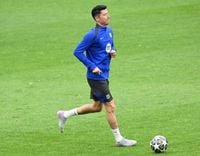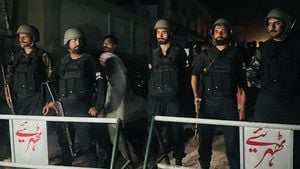On the evening of May 6, 2025, the much-anticipated second leg of the UEFA Champions League semi-final unfolded at the iconic Giuseppe Meazza Stadium, where Inter Milan faced off against FC Barcelona. Following an exhilarating 3-3 draw in the first leg just six days prior, the stakes were high as both teams battled for a coveted spot in the final.
As the match kicked off at 21:00, FC Barcelona's coach Hansi Flick made a notable decision, starting Wojciech Szczęsny in goal. Szczęsny, who had been sidelined in the previous league match, returned to the lineup amidst much fanfare. Meanwhile, star striker Robert Lewandowski, recovering from an injury sustained in mid-April, began the match on the bench, with expectations that he would make an impact in the second half.
On the other side, Inter Milan's coach Simone Inzaghi opted for a slightly different approach, leaving both Nicola Zalewski and Piotr Zieliński among the substitutes. The two Polish players had played significant roles in Inter's last Serie A match, a 1-0 victory over Hellas Verona, but were deemed rotational players for this high-stakes encounter.
The starting lineups set the stage for a thrilling contest. Inter Milan featured Yann Sommer in goal, supported by a defensive line of Yann Bisseck, Francesco Acerbi, and Alessandro Bastoni. The midfield boasted talents like Denzel Dumfries, Nicolo Barella, Hakan Çalhanoğlu, Henrikh Mkhitaryan, and Federico Dimarco, while Lautaro Martinez and Marcus Thuram led the attack.
For FC Barcelona, Szczęsny was shielded by Eric García, Pau Cubarsí, Iñigo Martínez, and Gerard Martin in defense. The midfield was anchored by Frenkie de Jong and Pedri, with Lamine Yamal, Dani Olmo, Raphinha, and Ferran Torres providing attacking options.
As the match progressed, the atmosphere in the stadium was electric, with fans on the edge of their seats. The referee for the match, Szymon Marciniak, officiated with precision, supported by assistants Tomasz Listkiewicz and Adam Kupsik, while Paweł Raczkowski served as the technical referee. The VAR officials, Dennis Higler and Pol van Boekel, were also on hand to ensure fair play.
Given the dramatic nature of the first leg, where both teams exchanged goals in a thrilling display, fans were eager to see how the return match would unfold. Would Barcelona capitalize on their attacking prowess, or would Inter's solid defense hold firm?
The match had the potential to break records, particularly for the number of Polish players participating. If Szczęsny, Lewandowski, Zieliński, and Zalewski all found themselves on the pitch together, they would surpass the previous record of three Polish players in a Champions League match, held by Lewandowski, Jakub Błaszczykowski, and Łukasz Piszczek from the 2012/2013 season.
As the first half drew to a close, both teams had their chances, but the score remained level at 0-0, a reflection of the tight contest. The second half promised to bring further excitement, particularly with Lewandowski poised to make his entrance.
With the match still in the balance, the tension was palpable. Fans could feel that a single moment of brilliance could tip the scales in favor of either team. Would it be a stunning goal from a Barcelona forward or a decisive strike from Inter's attack?
Throughout the match, the tactical battle between Flick and Inzaghi was evident. Flick's decisions regarding player rotations and formations were crucial in setting the tone for Barcelona’s attacking strategy. Inzaghi, on the other hand, seemed to adjust his tactics in response to Barcelona's movements, showcasing the chess match that often characterizes high-level football.
As the clock ticked down, the anticipation grew. Would either team break the deadlock, or would the match head into extra time? Fans knew that if the score remained tied at the end of regulation, the match would go to extra time, and potentially penalties, adding another layer of drama to an already thrilling encounter.
With the Champions League final looming on May 31 in Munich, both teams were acutely aware of the implications of this match. The winner would not only secure a place in the final but would also carry the hopes of their respective fanbases into the concluding match of Europe’s premier club competition.
As the second half commenced, the substitution of Lewandowski brought an additional spark to Barcelona's attack. His presence on the field was felt immediately, as he sought to create opportunities and capitalize on any defensive lapses from Inter. Meanwhile, Zieliński and Zalewski remained ready on the sidelines, prepared to make their mark should they be called upon.
In the end, the match was not just a battle between two football clubs but a showcase of national pride, with Polish players featuring prominently on both sides. The potential for a historic moment loomed large, as fans and players alike hoped for a memorable night at the Meazza.
As the match approached its climax, the excitement was palpable. Every pass, every tackle, and every shot on goal was met with cheers and gasps from the crowd. The outcome remained uncertain, but one thing was clear: this was a Champions League semi-final that would not be forgotten.





